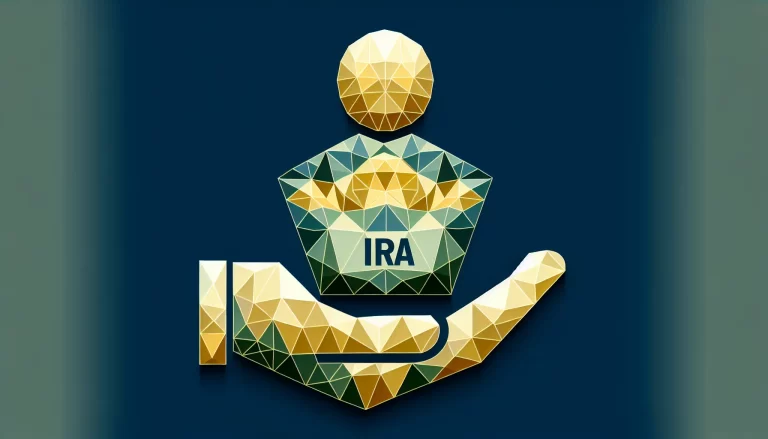Asking, “Who holds the gold in a Gold IRA?” is honestly a question that I am surprised more people aren’t asking.
You would think when it comes to putting your life savings into a tangible asset that you’d be just a little curious about where that asset is being held.
Now, if you aren’t new here and have read some of my other articles, you know that the IRS has rules about where your Precious Metals in an IRA are stored.
Also, if you are new here – welcome! On this website we strive to be the best provider of precious metals IRA information on the web.
Funny enough, it seems many people want to hold their Gold from their Gold IRA in their own home…which you can’t, at least until you are a bit older.
So, in this article we are going to look at where Gold IRA custodians send your gold for storage.
If you plan to read this article in full, I would expect to invest around 9 minutes to read this one. (Also, did you see what I did there? haha)
So, to kick it off let’s talk about the precious metals that you can hold in an IRA, even beyond gold.
Quick Disclaimer:
The content provided in this article is for informational purposes only and should not be considered financial or investment advice. Always consult with a qualified financial advisor before making any decisions regarding Precious Metals, Investing, or IRAs. Additionally, this article contains affiliate links, and I may earn a commission if you make a purchase through these links, at no additional cost to you.
Another question, I have been asked is, “What Gold IRA companies are the best” or “Which IRA companies are the most trusted?”.
If you’d like more information, below is a link to a comparison PDF by Augusta Precious Metals that could be useful. (It’s also free.)
Augusta Gold IRA Company Integrity Checklist
Holding Physical Gold in a Gold IRA
Types of Precious Metals Allowed
When you’re setting up a Gold IRA, it’s important to know the types of precious metals allowed.
The IRS permits four main types of precious metals in an individual retirement account: gold, silver, platinum, and palladium.
These metals must be in the form of IRS-approved coin or bar products (Wikipedia).
Although gold is the most commonly purchased, the term “Gold IRA” can refer to any combination of these precious metals.
Here’s a quick overview of the allowed metals:
| Metal | Forms Allowed |
|---|---|
| Gold | Coins, Bars, Rounds |
| Silver | Coins, Bars, Rounds |
| Platinum | Coins, Bars |
| Palladium | Coins, Bars |
For more detailed information, check out our guide on what is the safest gold investment?.
IRS-approved Gold Products
The IRS has specific requirements for the types of gold products that can be included in a Gold IRA.
Gold must meet a minimum fineness requirement of 99.5% purity, equivalent to 24 karats, ensuring the gold held is of investment-grade quality.
Below are some examples of IRS-approved gold products:
| Product Type | Examples |
|---|---|
| Coins | American Eagle, Canadian Maple Leaf |
| Bars | NYMEX- or COMEX-approved bullion bars |
| Rounds | Investment-grade gold rounds |
Certain coins, such as South African Krugerrands and British Sovereign coins, do not meet the fineness requirements and are not allowed in a Gold IRA.
Gold bars and rounds must also adhere to the 99.5% purity rule and need to be produced by a NYMEX- or COMEX-approved refinery or a national government mint.
This ensures that the gold in your IRA is of the highest quality and authenticity.
For additional insights on the differences between various IRA accounts, visit our page on what is the difference between a gold ira and a traditional ira?.
Another common question I get asked about sales tactics used by Gold IRA companies is about how silver is leveraged and mentioned.
If you want to learn more, below are two free PDFs by Augusta Precious Metals that break down how to check the integrity of an IRA provider as well as information on how Silver is used as a sales tactic.
Augusta Precious Metals Links:

Custodians and Storage Requirements
When it comes to owning gold in an IRA, understanding the role of custodians and the requirements for storage is crucial. This section will provide clarity on IRS regulations and the importance of security and asset protection.
IRS Regulations on Custodians
To comply with IRS requirements, all IRAs, including precious metals IRAs, must leave their assets in the possession of a trustee or custodian, not in the owner’s individual possession. This ensures that the assets are managed according to strict standards. Nonbank IRA trustees must demonstrate to the IRS that they will meet Treasury standards of accounting, auditing, reporting, and asset security.
| Requirement | Description |
|---|---|
| Trustee/Custodian Possession | Assets must be held by an approved trustee or custodian. |
| Treasury Standards | Custodians must adhere to standards of accounting, auditing, and reporting. |
| Security Measures | Custodians must ensure the security of the assets. |
To own gold in an IRA, one needs a true self-directed IRA offered by a few custodians. Most IRA custodians only allow investments in publicly-traded securities. The IRS regulations require that the coins or bullion be in the possession of the custodian. IRA owners cannot buy metals with IRA money and store them on their own (Forbes).
Security and Asset Protection
Security and asset protection are paramount when holding physical gold in a Gold IRA. The IRS allows several forms of gold to be held in a Gold IRA, including gold bars, gold coins, and gold rounds, provided they meet the required purity standards. Ensuring that your gold is stored in a secure, IRS-approved depository is essential for protecting your investment.
| Type of Gold | Purity Standards |
|---|---|
| Gold Bars | Must meet IRS purity standards |
| Gold Coins | Must meet IRS purity standards |
| Gold Rounds | Must meet IRS purity standards |
Custodians are responsible for the safekeeping and management of your gold. They must comply with IRS regulations and ensure that the gold is stored in a secure and approved facility. This not only protects your investment but also ensures that it remains compliant with IRS rules. For more information on the role of custodians, you can read our section on who holds the gold in a gold IRA?
If you’re considering investing in a Gold IRA, it’s important to understand the eligibility and contribution limits, as well as the tax advantages. Check out our articles on how do I start a gold IRA? and is gold a good investment for retirement? for more insights.
Who Holds the Gold in a Gold IRA?
When investing in a Gold IRA, understanding who holds the gold and the regulatory requirements is critical. The custodian plays a pivotal role in ensuring the security and compliance of your investment.
Custodian Responsibilities
To comply with IRS regulations, all IRAs, including Gold IRAs, must have their assets held by a trustee or custodian, not in the owner’s individual possession (Wikipedia). This ensures that the assets are secure and properly managed. Custodians are responsible for:
- Safeguarding the physical gold
- Performing regular audits
- Ensuring proper accounting and reporting
- Providing secure storage facilities
Custodians oversee the entire process from purchasing the gold to storing it in an IRS-approved depository. This ensures that your investment is protected and compliant with IRS rules.
IRS Compliance and Regulations
The IRS has strict regulations regarding the possession and storage of gold in a Gold IRA. Nonbank IRA trustees must meet Treasury standards of accounting, auditing, reporting, and asset security (Wikipedia). IRS compliance involves:
- Approved Custodians: Only certain custodians offer true self-directed IRAs that allow investments in precious metals. Most traditional IRA custodians do not permit these investments.
- Physical Possession: The IRS mandates that the coins or bullion must be in the possession of the custodian. IRA owners cannot purchase metals with IRA funds and store them personally.
- Distribution Rules: When taking distributions, the account holder may either liquidate their IRA metals for cash or take physical possession of them. Both actions are considered an IRA distribution and are taxed accordingly.
Understanding these regulations helps ensure that your Gold IRA remains compliant and that your investment is secure. For more insights on Gold IRAs, explore our articles on how to open a gold ira, can i cash out gold ira, and how is a gold ira taxed.
By adhering to IRS guidelines and choosing a reliable custodian, you can rest assured that your gold investment is in safe hands. Dive deeper into the benefits and risks of Gold IRAs by reading more about are gold iras a good idea? and what are the risks of a gold ira?.

Risks and Considerations of Gold IRAs
While Gold IRAs offer unique benefits such as diversification and a hedge against inflation, they also come with specific risks and considerations that you must evaluate.
Volatility and Returns
Gold IRAs may yield lower returns compared to other investment options, depending on capital growth and the timing of the investment. Gold is generally considered a stable investment, but it typically does not yield high returns compared to riskier assets like stocks and bonds (USA Today).
| Asset Type | Expected Annual Return (%) |
|---|---|
| Stocks | 7-10 |
| Bonds | 3-5 |
| Gold | 1-2 |
This table shows the potential annual returns on different asset types, highlighting that gold generally has lower returns.
Additionally, gold prices can be volatile, with market fluctuations impacting the value of your investment. This volatility can pose a significant risk, particularly if you need to liquidate your assets during a downturn.
Fees and Liquidity Concerns
Gold IRAs come with higher fees compared to traditional IRAs. These fees can include:
- Setup Fees: Initial fees for setting up the account.
- Storage Fees: Costs associated with storing physical gold in a secure depository.
- Custodian Fees: Fees paid to the custodian for managing your account.
- Transaction Fees: Costs incurred when buying or selling gold.
| Fee Type | Average Cost ($) |
|---|---|
| Setup Fees | 50 – 150 |
| Storage Fees | 100 – 300 per year |
| Custodian Fees | 75 – 200 per year |
| Transaction Fees | Varies |
These fees can add up, reducing the overall returns on your investment. For a detailed breakdown of costs, visit our article on how much does a gold ira cost.
Liquidity is another concern with Gold IRAs. Selling physical gold can be more complex than liquidating other assets like stocks or bonds. The process can take longer, and there may be additional costs involved in selling and shipping the gold. This can make it challenging to quickly access your funds in times of need.
For more information on how to navigate these risks, explore our article on what are the risks of a gold ira?.
By understanding these risks and considerations, you can make a more informed decision about whether a Gold IRA is the right investment for you. Be sure to weigh the potential benefits against these challenges and consult with a financial advisor for personalized advice.
Even More Questions you might be asking:
- are gold iras a good idea?
- can i borrow from my gold ira?
- what is the difference between a gold ira and a traditional ira?
- how much gold do you need to retire?
- do iras grow your money?
- who has the best gold ira?
- do you pay tax on gold?
- how much does a gold ira cost?
- can i cash out gold ira?
- can i store my gold ira at home?
- how do i start a gold ira?
- is there a free gold ira kit?
- can i convert my ira to a gold ira?
- how is a gold ira taxed?
- can i contribute to a gold ira?
- is gold a good investment for retirement?
- what is the best ira account for uk?
- what is the age limit for gold ira?
- which gold ira company is best?
- what is the most trusted gold ira?
- how do i open a gold ira?
- what is the safest gold investment?
- does vanguard offer a gold ira?
- is buying gold a good investment?
- where can i store my gold ira?
- what are the risks of a gold ira?
- how much are gold ira fees?
- does a gold ira earn interest?
- how much can you put in a gold ira?
- what is the minimum investment for a gold ira?
- is gold a good retirement investment?
- what are the cons of a gold ira?
- is gold ira taxable?
- what are the benefits of investing in a gold ira?
- what is the best gold ira company?



